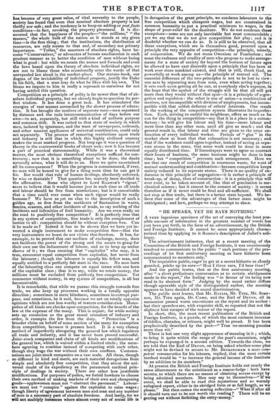"HE SPEAKS, YET HE SAYS NOTHING."
A VERY ingenious specimen of the art of conveying the least pos- sible amount of information in the greatest number of words has just been put forth, in the form of an advertisement, by the British and Foreign Institute. It cannot be more appropriately charac- terized than by applying to it Romeo's description of Juliet's soli- loquy.
The advertisement intimates, that at a recent meeting of the Committee of the British and Foreign Institute, it was unanimously resolved to communicate to the public "such portions of the pro- ceedings of its first anniversary meeting as have hitherto been communicated to members only."
The inquisitive public, eager to get at a secret hitherto so closely guarded, pricks up its ears—"Hau I three ears, I'd hear tbee I " And the public learns, that at the first anniversary meeting, after" a short preliminary conversation as to certain abridgments made in the report," the feeling was "in favour of its being now read in its shortest form." Judging by the usual rather diffuse though agreeable style of the distinguished author, the meeting appears to have decided with sound discrimination.
The public next learns, that Mr. BAYLIS, Mr. TITE, Mr. Sum- soN, Mr. TITE again, Dr. CAMP, and the Earl of DEVON, all in succession passed warm encomiums on the report and its author : but their speeches are, with exquisite skill, so reported that not the slightest hint escapes of the tenour of the report. In short, this, the most recent publication of the British and Foreign Institute, is a puzzle, of which the most eminent inventor of riddles, charades, or rebuses, might well be proud. It has been prophetically described by the poet—" True no-meaning puzzles more than wit."
There is but one very slight appearance of meaning in it ; which, to bring it quite within the range of the poet's encomium, might perhaps be expunged in a second edition. Towards the close, we are told that the Earl of DEVON, on being asked whether some plan might not be devised to secure to Mr. BUCKINGHAM a more com- petent remuneration for his labours, replied, that the most certain method would be "to increase the general income of the Institute by an addition to its members." At present the British and Foreign Institute holds out nearly the same allurements to the uninitiated as a mason-lodge : both have secrets, to which there are no means of obtaining access except by being admitted members. Men may say to themselves—"If we enter, we shall be able to read this mysterious and so warmly eulogized report, either in its abridged form or at full length, as we please." But then comes the scaring reflection—" What if after all it should turn out to be not worth the reading ? There will be no getting out without forfeiting the entry-money."


























 Previous page
Previous page